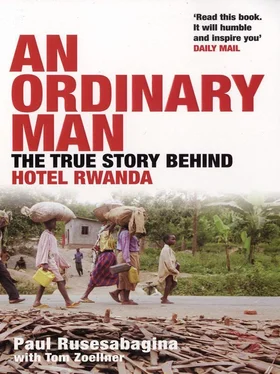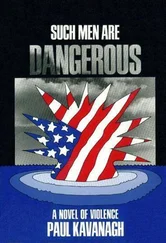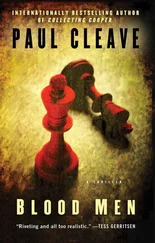The rebel soldiers were hardly welcoming. They treated us like prisoners of war. Some of the stronger men among us were offered the chance to take a few days of military training to fight against the Rwandan Army. The offer was a little tempting, but I refused. “I always fight with words, ” I told them. “Not with guns.” Many of the refugees who chose to join up never came back; they were killed in combat, or killed by their supposed protectors in the rebel army. They were invited for meetings and that was their last night on earth.
What I really wanted was to get the hell out of Rwanda. I had had enough. We were away from the militias but still in danger to be killed anytime by the rebels. We were also filthy and exhausted and needing a break. I told my new hosts that I and my family wanted either to be driven to the Ugandan border or flown to Belgium. What I got in reply was a wishy-washy response, that classic Rwandan no of which I was thoroughly sick: “We will look into it for you, Mr. Manager.” Nothing happened, of course. Day followed day. All we could do was eat more purloined bananas and wait for the war to be over, or to be killed ourselves.
Meanwhile, one of the largest mass migrations of people in African history was under way.
The government of France had been in continual and friendly contact with its allies at the top of the Hutu government and was growing increasingly alarmed at the likelihood of their neocolony falling to English-speaking rebels. In mid-June, just as my hotel was being evacuated, the French announced plans to send a peacekeeping mission to the western part of Rwanda for “humanitarian” reasons. This gave the génocidaires the chance to look like victims instead of aggressors, and they started to pack up and leave for the protected area that became known as “the Turquoise Zone.”
RTLM radio then performed its final disservice to the nation by scaring the living daylights out of the people remaining in Rwanda, a considerable number of whom had just spent two months murdering their neighbors and chasing the less compliant ones through swamps. The radio told them that the RPF would kill any Hutus they found in their path and encouraged all its listeners to pack up their belongings and head either to Tanzania or the western part of the country and the borders of the Democratic Republic of Congo (what used to be called Zaire), where the French soldiers awaited. Nearly 1.7 million people heeded the call. Entire hills and cities mobilized into caravans: men carrying sacks of bananas, some with bloody machetes in their belt loops; women with baskets of grain on their heads; children hugging photo albums to their chests. They wound their way past corpses piled at the side of the road and the smoldering cooking fires in front of looted houses. I am sorry to say that the dire predictions of the radio were not rooted in fantasy, as the rebels did conduct crimes against humanity in revenge for the genocide and to make people fear them. In any case, what was left of Rwanda emptied out within days.
The U. N. Security Council, so ineffective in the face of the genocide, lent its sponsorship to the camps the French set up to protect the “refugees.” The main place of comfort to the killers was at a town called Goma, just over the border into the Democratic Republic of Congo. It is in a bleak area at the foot of a chain of volcanoes and the town is set in a plain of hardened black lava. Into this hellish landscape, the French airlifted twenty-five hundred well-equipped paratroopers, Foreign Legionnaires, helicopters, fighter jets, tents, water supplies, food, jeeps-everything, in short, that the pathetic UN force could have used when the murders were at their height in April. Now all of these assets were being used to feed and shelter some of the very people who carried out the slaughter.
Many of the French troops sent to support the effort were apparently there in the belief that they would eventually be used to attack the rebel army, which was closing in on Kigali. Meanwhile, the Interahamwe began organizing the refugees into squadrons in the camps, preparing them for an imminent return to Rwanda to keep filling the graves. Radio RTLM set up relay transmitters in the camp so their broadcasts could continue to be heard among the faithful. It was difficult to tell the innocent from the guilty, but comfort was provided to everyone.
In a surprise for all of us the United States finally was persuaded to act. When cholera and other diseases broke out the Clinton administration announced it would seek $320 million in aid for the camps at Goma and the killers and announced a public health initiative to clean up the water-bloated corpses that had floated over into Uganda. This US aid package totaled more than sixteen times what it would have taken to electronically jam the hate radio, which would have stopped many of those people from becoming corpses.
On July 4, with much of the civilian population in flight, the RPF captured the capital of Kigali after a brief battle. They had conquered a ruined city and caused further destruction. Houses were knocked over. Churches were covered in blood. Hospitals were empty shells, looted of supplies. Land mines and live mortar rounds were lying everywhere. Wrecked vehicles blocked the roads. And the corpses were stuffed everywhere: inside closets, underneath desks, and down water wells, and shoved casually to the edge of the sidewalks. The stench of decaying flesh choked the air. Barely thirty thousand people remained, a tenth of Kigali ’s population before the genocide began.
Rwanda ’s other major cities toppled swiftly from there and the country was all but conquered. On July 14 the plug was pulled on RTLM for good. Less than a week later the rebel army swore in a new government. It marked the official end of the genocide, but not the end of the killings. The aftermath would be long and dirty.
I was informed that my request to travel to Belgium had been approved on one condition: that I travel alone, leaving my wife and children behind. “Forget it, ” I told them. “I have changed my mind. I am staying now.”
The rebel army took us back to the Mille Collines, which was in wretched shape. After I had left some people had taken it upon themselves to start cooking fires on the lobby tiles and ash was everywhere. The hallway carpets were covered in a disgusting glaze of grease and human waste. Doors were broken from their hinges. The RPF had looted the remaining supply of drinks and liquor that I had used to keep so many people alive. The kitchen was a disaster. Almost everything of value had been stolen or damaged beyond repair.
I cleared the squatters out, rallied what staff I could find, and got to work. We obtained some cleaning solution and carpentry equipment to make the place semipresentable again. My colleague Bik Cornelis had arrived back in the country from the Netherlands and was working side by side with me. The hotel had to start functioning again. Rwanda was about to be besieged with journalists, humanitarian workers, peacekeeping soldiers, and more than 150 nongovernmental organizations. All those people who had abandoned us during the slaughter were coming back and they needed a place to stay. The irony was too bitter to think of for long. There were many things it didn’t pay to think of for very long. And truthfully, it felt good just to have this housekeeping task in front of me, and I lost myself in a million details. I am a hotel manager and this was where I belonged.
We reopened on July 15, having been closed a little less than a month.
My family settled in the manager’s house at the Hotel Diplomates, where some of our friends had hidden under the noses of the génocidaires. It was where we felt the safest. We did not dare to go back to our family house in Kabeza, and I had no particular desire to see those neighbors of mine who had transformed themselves into lunatics during those first days in April.
Читать дальше











![Paul Finch - A Wanted Man [A PC Heckenburg Short Story]](/books/702381/paul-finch-a-wanted-man-a-pc-heckenburg-short-sto-thumb.webp)
